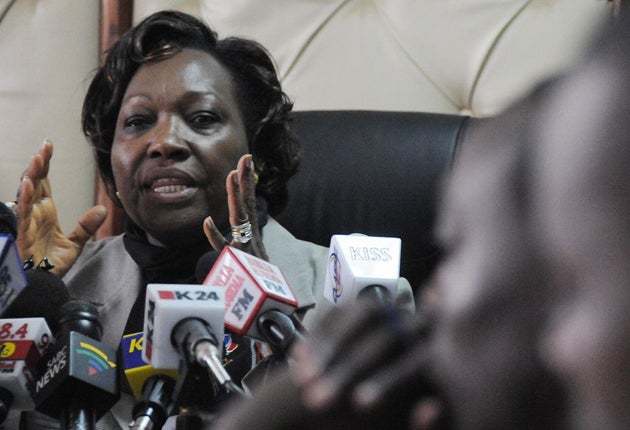UK student sparks Kenya swine flu alert
Panic as visiting Briton becomes country's first confirmed case of virus

Your support helps us to tell the story
From reproductive rights to climate change to Big Tech, The Independent is on the ground when the story is developing. Whether it's investigating the financials of Elon Musk's pro-Trump PAC or producing our latest documentary, 'The A Word', which shines a light on the American women fighting for reproductive rights, we know how important it is to parse out the facts from the messaging.
At such a critical moment in US history, we need reporters on the ground. Your donation allows us to keep sending journalists to speak to both sides of the story.
The Independent is trusted by Americans across the entire political spectrum. And unlike many other quality news outlets, we choose not to lock Americans out of our reporting and analysis with paywalls. We believe quality journalism should be available to everyone, paid for by those who can afford it.
Your support makes all the difference.A Nottingham medical student who travelled through some of the poorest parts of Kenya after contracting swine flu in the UK has sparked a state of national alarm in the East African country, The Independent can disclose.
The 20-year-old man, who has not been named, spent a week visiting hospitals, health clinics, orphanages and schools with a group of medical undergraduates from the Nottingham university unaware he was carrying the highly infectious virus. It is Kenya's first confirmed case of swine flu.
The man's girlfriend, also a student at Nottingham, contacted him last week to tell him she had been diagnosed with the H1N1 strain. He handed himself over to health authorities after complaining of a headache and joint pains during a field trip to the city of Kisumu in western Kenya, and was confirmed as having the virus on Sunday.
He and 33 other Nottingham students were travelling with a charity called the Kenyan Orphan Project. The virus has since spread to eight other members of the group, and all 34 have been placed under quarantine at a hotel in Kisumu. Kenyan journalists have been disguising themselves as doctors to gain entry to the hotel and interview the students. Yesterday, the charity's director Ted Allen told The Independent the group had spent their first week visiting a number of projects around the country before the 20-year-old was diagnosed, and that he feared the virus may have spread to Kenyans.
"If that happens then it's just very, very unfortunate," he said. "It's the last thing we or the students wanted. Our objectives are to provide help and support for orphans and vulnerable children. Clearly, we're anxious about the forthcoming days and weeks."
Three days after the medical students flew out to Kenya on 21 June, the University of Nottingham announced that 13 of its students had contracted swine flu. One of them was the 20-year-old man's girlfriend.
"We have a comprehensive briefing and declaration process prior to students going to ensure this kind of thing doesn't happen," Mr Allen said. "It was just totally unforeseen that this student had mixed a couple of weeks previously with other students who were subsequently diagnosed with having it back in the UK. That's the great tragedy of it all."
Local health authorities in Kenya refused to provide doses of the antiviral drug Tamiflu to the students, arguing their conditions were not serious enough and that the stockpile had been set aside for the use of its own citizens. The Kenyan Orphan Project had to buy a supply of the drug from a private hospital.
On Monday, Kenya's Public Health and Sanitation Minister Beth Mugo confirmed the British student was the country's first case of swine flu. She said: "We have embarked on tracing any contacts that the students have made while in Kenya. If any of the contacts exhibit flu-like symptoms, they will be tested and appropriately managed."
The mother of one of the quarantined students, who did not want to be named, said she was communicating with her daughter by text message. Those who have not shown symptoms are reportedly in good spirits, even enjoying a barbecue on the hotel's roof terrace.
"I think they felt quite threatened at the idea that they had infected Kenya," she said. "They are devastated to be missing the second week of their field trip."
She added that the group were being well looked after by their hotel, but said many of them were worried they would not be allowed to continue their travels in Africa after the charity trip finishes on Sunday. All are undergoing a second round of tests to determine whether they are clear of the illness.
A spokeswoman for the Foreign and Commonwealth Office said: "We can confirm that a British man tested positive for the H1N1 virus on 28 June in Kisumu. Further members of his group have since contracted the H1N1 virus. The [Kenyan] Ministry of Health have worked to identify all persons the group have come into contact with... and are monitoring them closely."
Since the start of the swine flu outbreak, Africa has had far fewer confirmed cases of the virus than other parts of the world, although it is thought that many might simply not have been reported. While there have been 67 cases of swine flu in Egypt and 17 in Morocco, the first case of the virus in sub-Saharan Africa was not reported until 18 June.
However, health officials have warned that countries in the southern hemisphere could soon see a rise in cases of H1N1 because they are approaching winter, when people's immune systems are weaker.
Join our commenting forum
Join thought-provoking conversations, follow other Independent readers and see their replies
Comments